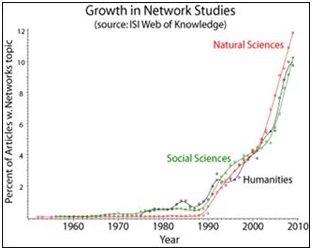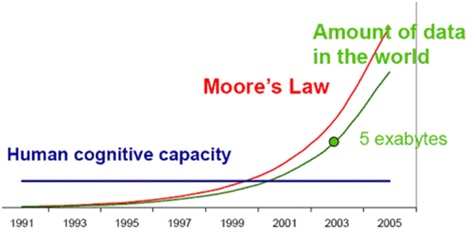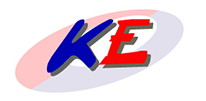No, I am not talking about black hole astrophysics or companies going by this name - the first pages of google results (unless you use google scholar) will not enlighten you.
The concept, however, does make sense intuitively by itself, even if you never heard of it before. It seems somewhat strange to me that only recently (around the Y2K barrier) people started to talk about it as more than just a metafor. The concept of “information horizon” and ways to extend a person’s information horizon are emerging topics in social sciences and have crucial implications for online marketing.

The raise of social networks served as a catalyst to people in various fields to start taking networks (any and all kind of networks) seriously. By 2008-2010, it was in full swing in the academia - you can find a whole crowd talking about it, from social scientists to mathematicians, from librarians to evolutionary biologists, from theoretical economists to marketing specialists. Networks become fashionable and I found a whole new slang to learn in order to be able to follow up: centrality, degree distribution, small-world networks, Erdős–Rényi networks, network robustness, clique formation, etc.
But not to worry, I will not slide into technicalities.
More and more, information horizon will become an issue in our society - that imaginary boundary that separates accessible information sources from those that aren’t accessible (at least not readily). We are assaulted with an unimaginable amount of information. Even when we talk about narrow fields of interest, people find it hard to keep up. Now add to that news, society, interests, literatury, shopping. What is relevant and what is not? What is it that you should pay attention to? Obviously, piling up the information is not helpful, it is still a pile. Building a “library” helps a lot, but it only solves the problem partially. Google, Bing, Yahoo and other search engines are addressing this issues. However, even if you find the “books” you're seeking, you still need to read them, decide how they help and find if books cited within are credible. Not only that you need to find a way to keep up with new books that keep pouring in while you are still reading… This is how the information load quickly escalates.

Above you can see a graph I picked from CTWatch Quaterly (November 2007 issue), where there is an interesting document entitled “Strategy for Petascale Visual Data Analysis Success”. The authors acknowledge the problem and offer as a potential solution data-driven visualization. More about it in a later post.
I want to briefly address some interesting conclusions about ways to overcome a limited information horizon. For instance, how do busy decision makers deal with a limited information horizon? Maybe we can learn from them? I read recently a thought-provoking executive strategy report published by the IBM that aims to show how analyzing the social network of a given company can reveal ways in which people overcome or expand their information horizon. I picked up two main ideas from this report about how people in our own social network can act as information horizon multipliers.
First, the fact that people prefer to deal with people. The the authors of the report mentioned a study demonstrating that people are roughly five times more likely to turn to friends or colleagues for answers than other sources of information such as a database or file cabinet. Moreover, the same report cites the author’s own research showing that an overwhelming majority (~85%) of the managers in the study claimed to have received knowledge critical to the successful completion of an important project from other people.
Second, people are not equally helpful in extending one’s informational horizon. Judging by the IBM report, several conditions must be met before you can benefit from your social network:
- You must have at least some idea what is it that people (the ones you want to appeal to) know themselves. What is your perception of their areas of expertise?
- You must have the perception of timely access to that person. You may know a very knowledgeable person, but he or she could be difficult to access: be it physical constraints or social status, there are factors degrading accessibility. This seems to be supported by some preliminary results showing that undergraduate students tend to rely more on colleagues than on professors when facing coursework related issues.
- You must perceive that the person you are asking to help you will actively engage with you in trying to understand your problem. If the person is just dumping information on you they usually avoid tackling with the problem
- You must perceive that you and the person in question is sufficiently safe relationship to allow you to expose lack of knowledge and imply dependence. If not, defensive behaviours will prevail and you will not benefit from that person’s help.
References mentioned:
Cross, R.L., Parker, A. and Borgatti, S.P. 2000. A birds-eye view: Using social network analysis to improve knowledge creation and sharing. Knowledge Directions. 2(1): 48-61. [pdf]
Image 1: https://dnac.ssri.duke.edu/about.php
Image 2: http://www.ctwatch.org/quarterly/print.php%3Fp=93.html






Posting comment as guest.
If you already have an account, please LOGIN.
If not, you may consider creating on. It’s FREE!